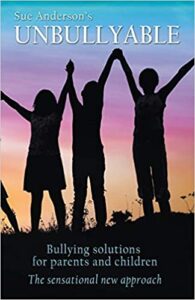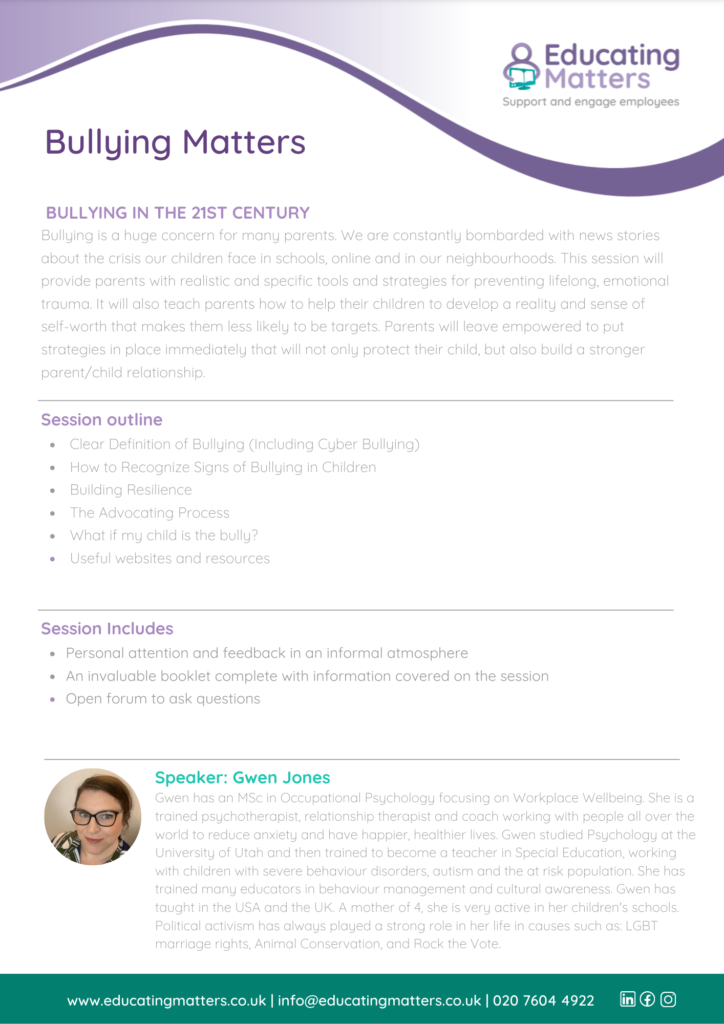Right on cue for anti-bullying week, my 12 year old has been having a really challenging time at school over the past few weeks.
One child in particular has been overtly unkind, teasing and excluding her; creating a ripple effect of problems in her friendship group.
Over almost 30 years, I have given other parents a lot of advice about bullying and observed it happening during my time working in schools. However, this is the first time I remember one of my 4 children struggling with it and it is really tough to watch and handle.
This child is the most sensitive, emotionally intelligent and empathetic of all my kids.
Despite coming home a number of times really upset and even crying, my daughter said to me over the weekend “Mummy I feel strong!”
So I wanted to share how we are navigating this in real life as a family and what is helping.
(I asked for my daughter’s permission to do so and she said if it can help other families she does not mind.)
1️⃣Firstly, I thanked her for having the courage to tell me what had been going on and that it’s really good that she feels safe and can trust me.
2️⃣I listened carefully and noted down what she was saying. I empathised, resisting the urge to tell her it will all be OK or making suggestions about how to solve it.
3️⃣When she was calmer, I explained that when you are hurt by someone, it’s not about something you have done but more about something going on with that person. Whilst she can’t control what anyone else says or does, she can chose how to respond.
❓I asked her how she wanted me to help and if there was something I could do.
I offered to speak to a teacher or even the boy’s mother whom I happen to know. (By the way my advice to parents is always handle these situations through the school rather than approaching parents directly. In my experience this doesn’t usually end well!)
So why did she come to me on Friday at the end of a hard week and say she felt strong?
⭐She decided to handle it herself. We brainstormed some ideas but she created her own plan of action around what to do and say at school.
⭐Since a very young age, we have always focused on nurturing her self-esteem to build resilience.
⭐She told the boy he was being really unkind and not behaving how a friend should behave.
⭐She said that if it continued she would have to speak to one of the pastoral teachers but she hoped that would not be necessary as she really did not want to be a snitch.
⭐When the teasing became quite intense on the coach ride home from school one day, she simply got up, calmly said “I don’t need to be treated like this” and walked away without reacting.
⭐ An older child on the coach had observed what was going on and also spoke to the boy.
The start of this week has seen a huge improvement at school for my daughter. The child even apologised.
I appreciate that bulling is never simple, whether your child is being bullied or is actually the bully.
Some of the most important steps you can take as a parent are:
- Be an ‘emotional container vessel’ for your child by providing that safe space for them to offload.
- Listen with empathy and understanding.
- Allow them to problem-solve.
- Initially resist the urge to interfere (unless of course it is going on for a prolonged period and you are noticing a real shift in your child’s mood and behaviour).
The best book I have read on this topic is ‘Unbullyable’ by Sue Anderson which is a step-by-step guide for parents to help their children move from bullied to unbullyable.

As with so many things in life, a lot of it boils down to mindset
Children can learn to:
- choose how they respond to other people’s attempts to bully them
- believe no one has the power to diminish their self-esteem
- understand how the bullying interaction works and how to interpret it
- stubbornly refuse to be affected by bullying attempts towards them
I would love to hear your stories.
What steps have you taken to support your child when they were bullied or if they were the one doing the bulling?
Many of our corporate clients have been running webinars on this very topic in recognition of ‘Anti-Bullying Week’. Do reach out if you would like us to address this topic in future.


